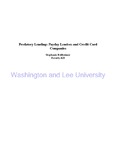Predatory Lending: Payday Lenders and Credit Card Companies

View/
Author
Bollheimer, Stephanie
Subject
Washington and Lee University, Shepherd Poverty Program
Predatory lending
Credit card fees
Interest rates
Finance, Personal--Study and teaching (Elementary)
Usury laws
Shipler, David K., 1942-
Metadata
Show full item recordDescription
Stephanie N. Bollheimer is a member of the Class of 2009 of Washington and Lee University. Capstone; [FULL-TEXT FREELY AVAILABLE ONLINE] Predatory payday lenders and credit card companies target lower income earners. Wage earners who utilize these services spend a disproportionate amount of money on interest and late fees. Therefore, these low earners have even less money to pay for basic life necessities. Consumer education, which begins at the elementary school level, is a technique to make low-income persons more knowledgeable about saving, borrowing and money management. This education will provide lower income earners the skills to make informed choices about credit. Clear, direct and obvious disclosure of financial terms will also assist the credit consumer to make informed choices. Therefore, government regulation of transparency laws should be reviewed to strengthen requirements placed upon credit marketing materials. Nation wide studies have revealed that low-income consumers are subject to predatory interest rates above and beyond a fair return for the creditor. If federal regulations were instituted to established a national cap, it would close the gap left open by current state and federal usury deregulation. If traditional financial institutions were given state and federal incentives to serve and locate branches within low-income neighborhoods, the residents would have ready access to traditional and regulated banking services, which may increase market competition. [From Conclusion]